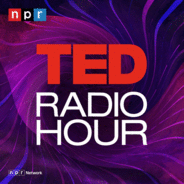For centuries, humans have relied on the oceans for resources and food... but even the deepest sea has its limits. This hour, TED speakers discuss how we can save our seas to save our planet. Guests include marine biologists Asha de Vos, Ayana Elizabeth Johnson, and Alasdair Harris, and oceanographer Sylvia Earle. Original broadcast date: June 25, 2021.TED Radio Hour+ subscribers now get access to bonus episodes, with more ideas from TED speakers and a behind the scenes look with our producers. A Plus subscription also lets you listen to regular episodes (like this one!) without sponsors. Sign-up at plus.npr.org/ted.Learn more about sponsor message choices: podcastchoices.com/adchoicesNPR Privacy Policy

Wissenschaft & Technik
TED Radio Hour Folgen
Exploring the biggest questions of our time with the help of the world's greatest thinkers. Host Manoush Zomorodi inspires us to learn more about the world, our communities, and most importantly, ourselves.Get more brainy miscellany with TED Radio Hour+. Your subscription supports the show and unlocks a sponsor-free feed. Learn more at plus.npr.org/ted
Folgen von TED Radio Hour
300 Folgen
-
Folge vom 14.06.2024Our oceans are in danger ... but it's not too late.
-
Folge vom 11.06.2024Body Electric: Type, tap, scroll, BREATHE! How our tech use impacts our breathDo you have "screen apnea"? Our special series Body Electric continues with former Microsoft executive Linda Stone who coined the term. Around 2007, Linda noticed she had an unhealthy habit while answering emails: she held her breath. On this episode, she tells host Manoush Zomorodi how she tested her friends and colleagues for "screen apnea" and what she's done since.Then, Manoush talks to the bestselling author of Breath, science writer James Nestor, who explains how shallow breathing impacts our physical and mental health. He takes us through a simple exercise to 'reset' our breath and relieve screen time stress.Binge the whole Body Electric series here.Sign up for the Body Electric Challenge and our newsletter here.Talk to us on Instagram @ManoushZ, or record a voice memo and email it to us at BodyElectric@npr.org.Learn more about sponsor message choices: podcastchoices.com/adchoicesNPR Privacy Policy
-
Folge vom 07.06.2024Pain Relief: New approaches to how we live with painThirty years into the opioid crisis, we still struggle to find other options for pain relief. This hour, TED speakers explain new understandings of how the brain interprets pain and new ideas to cope. Guests include equestrian Kat Naud, physician and researcher Amy Baxter and opioid reform advocate Cammie Wolf Rice. TED Radio Hour+ subscribers now get access to bonus episodes, with more ideas from TED speakers and a behind the scenes look with our producers. A Plus subscription also lets you listen to regular episodes (like this one!) without sponsors. Sign-up at plus.npr.org/ted.Learn more about sponsor message choices: podcastchoices.com/adchoicesNPR Privacy Policy
-
Folge vom 31.05.2024A Love Letter to the Ocean: Life, death and mating in the seaOceans cover nearly 75% of the Earth. While they seem vast and frightening, they're also enchanting and whimsical. This hour, TED speakers dive into stories of connection — and even love — in the sea. Guests include adventurer Catherine Mohr, marine biologists Marah Hardt and Ayana Elizabeth Johnson and venom scientist Mandë Holford. Original broadcast date: June 11, 2021TED Radio Hour+ subscribers now get access to bonus episodes, with more ideas from TED speakers and a behind the scenes look with our producers. A Plus subscription also lets you listen to regular episodes (like this one!) without sponsors. Sign-up at plus.npr.org/ted.Learn more about sponsor message choices: podcastchoices.com/adchoicesNPR Privacy Policy
